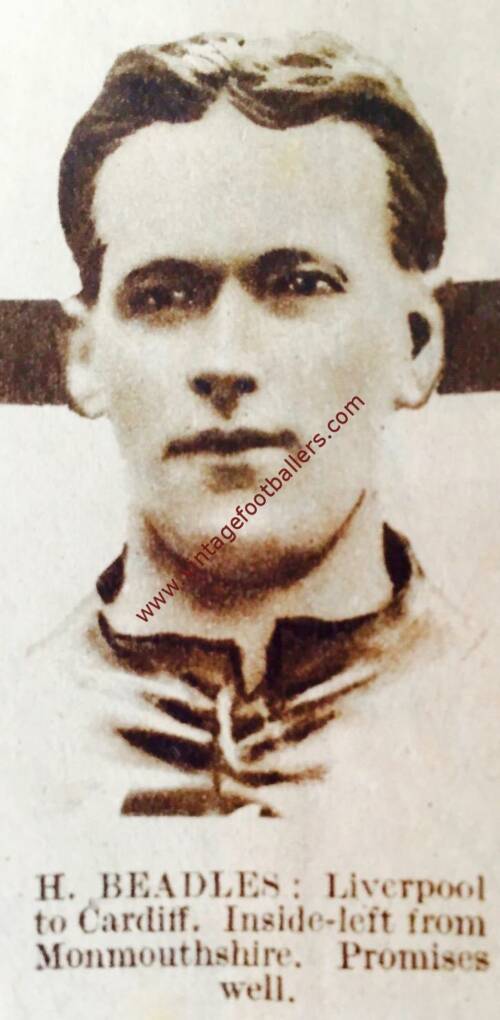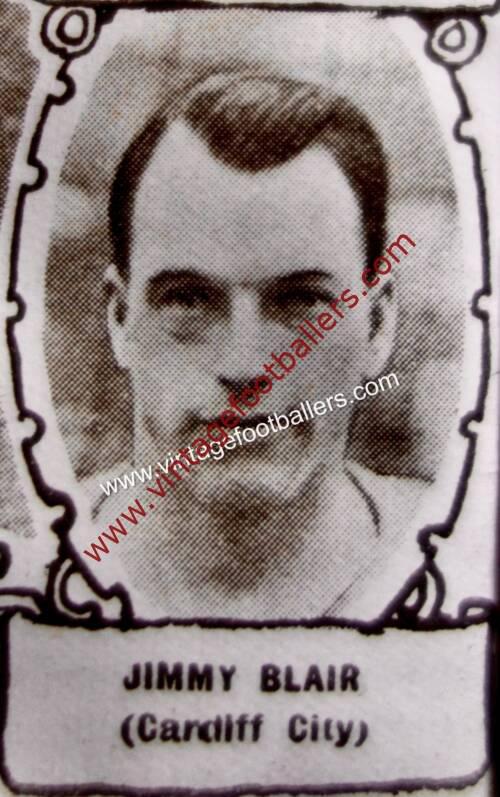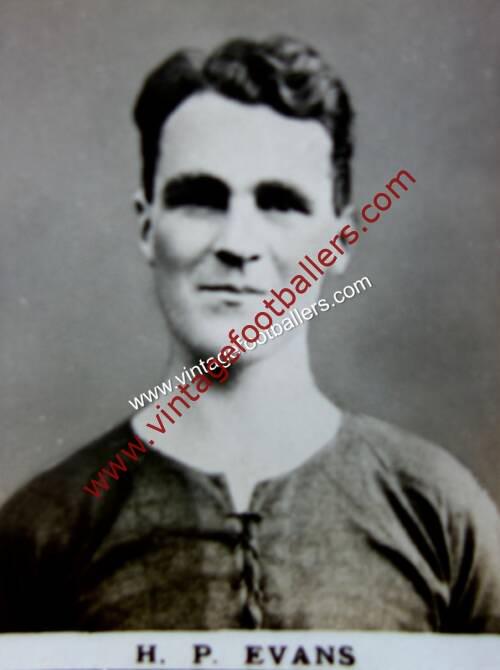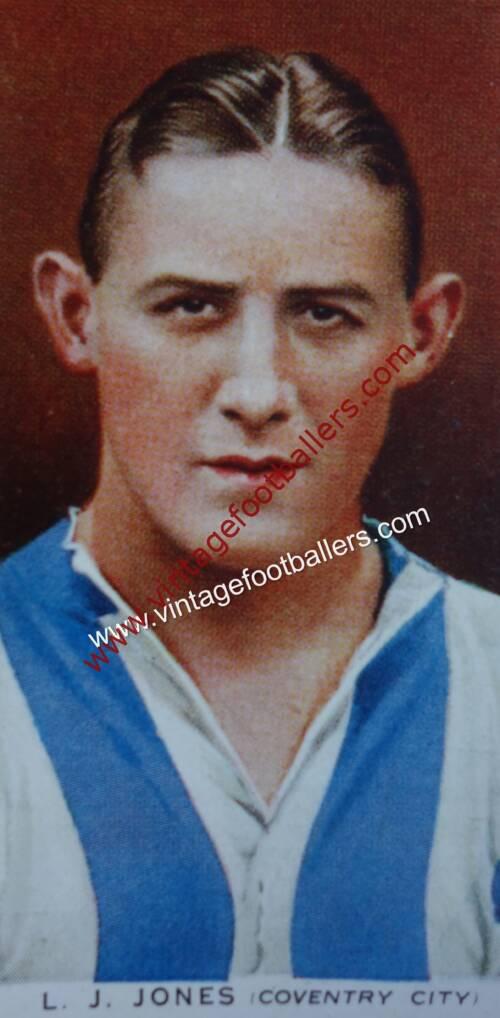Please choose your photo size from the drop down menu below.
If you wish your photo to be framed please select Yes.
Note: 16″x 20″not available in a frame.
Images can also be added to accessories. To order please follow these links
£8.95 – £49.95
Please choose your photo size from the drop down menu below.
If you wish your photo to be framed please select Yes.
Note: 16″x 20″not available in a frame.
Images can also be added to accessories. To order please follow these links
Llanllwchaiarn, Powys born inside left Harry Beadles played amateur football for his local side Newtown before the First World War, during which he enlisted in the 7th Battalion of the Royal Welch Fusiliers in 1914 at the age of 16, under the permitted age of enlistment, along with two of his older brothers, Ewart and Ernie. Beadles was a bugle boy. In 1915, his unit took part in the landing at Suvla Bay in the Gallipoli campaign where, despite still being under the minimum age, he served on the frontline as a rifleman. During this time, Beadles performed an action that would later see him awarded the Serbian Gold medal for gallantry. He received the honour for saving the life of a Serbian observer officer who had been wounded in no man’s land and was unable to make it back to the line. Under heavy rifle and artillery fire, Beadles helped the officer back, having his cap and epaulettes shot off in the process but remaining unharmed.
He remained on the frontline until December 1915, when the area was evacuated due to the heavy fighting. Due to the extreme cold, Beadles was suffering from frostbite and was found floating unconscious in the water at the time of the evacuation and was subsequently sent to a military hospital in Malta. After recovering he was sent to re-join his regiment, who were now stationed in Palestine. He took part in all three attempts to capture Gaza and the eventual push to take Jerusalem under the command of Edmund Allenby. During the Second Battle of Gaza, Beadles witnessed the death of his uncle Richard Pearce who was shot in the head while standing next to him. Beadles’ brother Ewart was awarded the Military Medal and promoted to the rank of Sergeant for his actions during the battle.
After the conclusion of the War, his unit remained in Palestine until mid-1919. It was here that he met former Wales international George Latham who was a captain in the Regiment and the pair would go on to be lifelong friends. During their time in Palestine, Latham and Beadles played football for their unit, the 7th Battalion of the Royal Welch Fusiliers, and won the British Forces in Egypt Football League Cup Final in 1919.
On his return to Wales, Beadles again played for his local side Newtown during the 1919-20 season, winning the Montgomeryshire & District Football League. The following year, he moved to Merseyside, where he turned out for amateur team Grayson’s of Garston of the West Cheshire Association Football League, an amateur side that represented a local shipping company, whilst also working for the company. Beadles often commented on his role at the company to family members, believing he was only employed due to his footballing skills as he would spend most working days making tea. In June 1921, he signed for First Division Liverpool along with teammate Danny Shone.
He made his Football League debut in a 1-0 victory over Chelsea on 24th September 1921 and scored six goals in his first eleven appearances, including a brace against West Bromwich Albion on 6th May 1922, as Liverpool went on to win the League Championship with Beadles being praised for a bright future at the club. He also played in Liverpool’s FA Charity Shield defeat to Huddersfield Town at Old Trafford at the end of the season, but the following season he played in only 4 matches as Liverpool retained the League Championship, and due to the form of the likes of Dick Johnson he was never a regular in the side, making just 18 appearances in all competitions during his three years at the club, although, following being part of back-to-back League titles, Beadles, along with each member of the squad, was given a gold watch by the club.
He moved to Cardiff City in August 1924, where his friend George Latham was working on the training staff. Signed as cover Joe Clennell, Beadles was forced to wait until 27th September to make his debut for the club, covering for the injured Clennell in a 1-1 draw with Tottenham Hotspur. He was forced to wait another month to make his second appearance for the club, playing in place of Jimmy Gill during a 2-1 victory over Everton on 18th October. With Gill injured, Beadles was handed a run of games in the first-team and responded by scoring five goals in four matches during November 1924, including a brace during a 4-1 victory over Bury. His prolific form saw Clennell unable to regain his place in the side as Beadles scored four more goals for the club in December, including scoring in consecutive matches against West Ham United on Christmas Day and Boxing Day.
However, he was unable to maintain his form and a goal drought followed, failing to score in ten matches in January and early February 1925, leading to manager Fred Stewart dropping Beadles from the side. He appeared sporadically for the side during the remainder of the 1924–25 season, eventually breaking his goal drought during a second 2-1 victory over Everton at Goodison Park, as Stewart offered chances to other players, including Clennell, Alfie Hagan and Paddy McIlvenny.
Beadles participated in Cardiff’s monumental 1925 Cup run and scored in both the quarter final of the FA Cup in a 2-1 home victory over Leicester City and a 3-1 success over Blackburn Rovers in the semi final at Meadow Lane, Nottingham as Cardiff reached the first FA Cup Final in their history. He was part of the side selected to play in the Final, a match lost 1-0 to Fred Tunstall’s goal for Sheffield United.
In recognition of his fine form Beadles won two caps for Wales, playing in consecutive matches on 14th and 28th February 1925 in defeats to Scotland and England at Tynecastle and The Vetch Field in the 1925 British Home Championship.
The following year, Beadles scored in the opening game of the 1925-26 season during a 3-2 defeat to Manchester City and scored three times in five further appearances in the opening months of the season. However, despite this form, Beadles was sold to Sheffield Wednesday in order to raise money after the arrival of Joe Cassidy from Bolton Wanderers, having scored 16 goals in 39 appearances for Cardiff City.
Beadles never played for the first team at Sheffield Wednesday, only ever making appearances for The Owls’ reserve side, and was allowed to join Southport in 1926, being appointed club captain on arrival and scoring on his debut during a 1-1 draw with Lincoln City in August 1928. Arriving alongside fellow Welsh international Jack Newnes, Beadles scored 20 League goals during his first season at the club, including hat-tricks during victories over New Brighton and Walsall. He also scored in the side’s third round giant killing FA Cup victory over First Division club Blackburn Rovers. However, he was forced to miss their fourth round tie against Beadles’ former club Liverpool due to injury. He spent three seasons at Southport, finishing as the club’s leading goalscorer in all three seasons and setting a new club record by scoring in six consecutive matches, between 21st April 1928 and 15th September 1928, hitting the 20 goal mark in each of his three seasons. Beadles left the club in April 1929 due to a persistent knee injury, scoring a hat-trick in his final ever game in the Football League, a 6-2 victory over Hartlepool United on 27th April 1929. During his time with Southport, Beadles scored 65 goals in 102 appearances.
Following his departure from Southport, he was appointed player-coach at Irish side Dundalk, making his debut on 25th August 1929 in a match against Shamrock Rovers. In his only season at the club, he led them to the semi-final of the FAI Cup, losing 2-1 to Brideville, a sixth-placed finish in the League of Ireland and handed first team opportunities to Joey Donnelly and Tommy Godwin. However, he retired from football at the end of the season after persistent injuries, with his family being unable to settle in Ireland. After his retirement he later became a publican. An avid Liverpool supporter, still attending games well into old age after his time playing for the club, Beadles became well known for his final bar calls at the pub, declaring “Time gentlemen please, and Evertonians!”.
| Weight | N/A |
|---|




